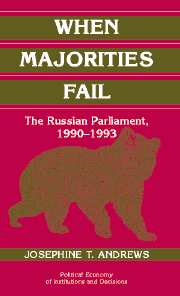Book contents
- Frontmatter
- Contents
- Acknowledgments
- 1 Introduction
- 2 Cycling in Action: Russia's Constitutional Crisis
- 3 Cycling and Its Consequences: A Theoretical Framework
- 4 Institutional Design and Implications for Majority Rule
- 5 Issue Dimensions and Partisan Alliances
- 6 The Structure of Preferences
- 7 Legislative Instability
- 8 The Dynamics of Agenda Control in the Russian Parliament
- 9 Implications of Disequilibrium in Transitional Legislatures
- References
- Index
2 - Cycling in Action: Russia's Constitutional Crisis
Published online by Cambridge University Press: 02 September 2009
- Frontmatter
- Contents
- Acknowledgments
- 1 Introduction
- 2 Cycling in Action: Russia's Constitutional Crisis
- 3 Cycling and Its Consequences: A Theoretical Framework
- 4 Institutional Design and Implications for Majority Rule
- 5 Issue Dimensions and Partisan Alliances
- 6 The Structure of Preferences
- 7 Legislative Instability
- 8 The Dynamics of Agenda Control in the Russian Parliament
- 9 Implications of Disequilibrium in Transitional Legislatures
- References
- Index
Summary
Recent history has shown that it is not easy for a new democracy to adopt its first constitution. Many post-communist countries struggled to pass new constitutions, limping along for years under amended versions of communist-era documents. Russia was no exception. Until Russia's President in the fall of 1993 used his powers of decree to disband the existing legislative institutions and call for a national referendum on a new constitution, Russia was mired in a constitutional impasse. Russia's constitutional crisis lasted almost two years (1992–1993), not long among post-communist transitions. Yet, unlike most other post-communist cases, its resolution was not the result of negotiation and compromise but of violence and armed confrontation.
Yeltsin's draconian solution to the constitutional crisis was a pivotal moment in the brief history of Russian democracy. Few of Yeltsin's supporters and none of his opponents would forget the haunting image of presidential troops firing on deputies holed up in the parliament building. Many lamented the harm that Yeltsin's precipitous and unconstitutional actions did to democratic reform. Even members of Yeltsin's closest circle of advisors criticized the strong presidential republic that Yeltsin's constitution created.
The constitutional crisis began with the collapse of the Soviet Union at the end of 1991. At that time, according to Russia's existing constitution, only the legislative branch of government had the authority to adopt a new constitution. Russia's two-tiered legislative structure included the large and ceremonial Congress of People's Deputies and the much smaller functional parliament (the Supreme Soviet).
- Type
- Chapter
- Information
- When Majorities FailThe Russian Parliament, 1990–1993, pp. 24 - 69Publisher: Cambridge University PressPrint publication year: 2002



